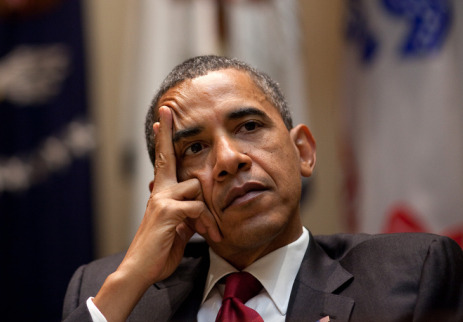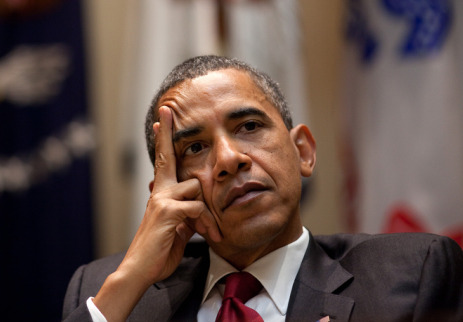 Photo: The White HouseOkay, we’ve had a few days to try to make sense of how a hulking climate bill can shrink to a lame-o energy bill, then shrivel to spill bill ultra-lite.
Photo: The White HouseOkay, we’ve had a few days to try to make sense of how a hulking climate bill can shrink to a lame-o energy bill, then shrivel to spill bill ultra-lite.
It’s interesting that President Obama has received much of the early blame, given that (10th-grade civics here!) Congress is a separate branch of government. But so it goes in the age of outsized expectations for the prez.
Could have used some drama, Obama: That first wave of Obama zappers raged that the president hadn’t just dropped the ball, he let the air out of it. One of most damning was Rolling Stone‘s Tim Dickinson. He wrote:
Rather than press forward with a climate bill in the Senate last summer, after the House had passed landmark legislation to curb carbon pollution, the administration repeated many of the same mistakes it made in pushing for health care reform. It refused to lay out its own plan, allowing the Senate to bicker endlessly over the details. It pursued a “stealth strategy” of backroom negotiations, supporting huge new subsidies to win over big polluters. It allowed opponents to use scare phrases like “cap-and-tax” to hijack public debate. And most galling of all, it has failed to use the gravest environmental disaster in the nation’s history to push through a climate bill — to argue that fossil-fuel polluters should pay for the damage they are doing to the atmosphere, just as BP will be forced to pay for the damage it has done to the Gulf.
Joseph Romm of Climate Progress and Andrew Revkin, in his Dot Earth blog, likewise took Obama to task for not elevating the fight against climate change to a national mission, instead allowing it to wallow in the muck of Capitol Hill horse-trading. Wrote Revkin:
On a host of issues, Obama campaigned as a voice of reason, willing to listen to all views, amid all the polarized shouting. But on climate and energy, he has not yet, apparently, found the strength to break free of the 20th-century-style left-right fight to forge a positive path that is true to the scope and time scale of the climate and energy challenge and could resonate with Americans, particularly the young generation that will inherit the environment being shaped by decisions, or indecision, now.
A New York Times editorial weighed in with the Obama bashers:
Mr. Obama never fully committed to the fight. He raised hopes here and around the world last year when he pledged in Copenhagen to reduce United States greenhouse gas emissions by 17 percent. Until a couple of months ago, he talked a good game, praising the House bill that aimed at the 17 percent target and promising to make every effort to get the Senate to follow. Then, despite the opportunity offered by the oil spill to press for a bold energy policy, the president essentially disappeared. What has passed for advocacy by the White House in recent days has consisted largely of one op-ed article by the energy adviser, Carol Browner, and daily assurances from the press secretary, Robert Gibbs, that the White House was “working behind the scenes.”
The Axis of Venal: But a second wave of reaction followed, one that didn’t absolve Obama of blame, but acknowledged that the president had a big rock to roll up the hill, given the efforts of “energy tax”-chanting Republicans, self-serving centrist Democrats, and paranoia-pandering Big Energy interests groups. Wrote Bradford Plumer in New Republic:
The White House was reluctant to dominate the legislative process, in part because some advisers thought the bill would fail no matter what, and they didn’t want to be responsible for that failure. Could a more assertive Obama have made a difference? I wonder. There weren’t 60 votes in the Senate for cap-and-trade, and White House pressure didn’t seem to work on potential swing votes like Scott Brown. This one may well have been beyond the president’s control.
Brian Merchant, in his Treehugger blog, deemed Obama “ineffectual” and suggested his legacy could suffer for not stepping up on climate change. But he saved his true disdain for others:
The Republicans, ‘centrist’ Democrats, and fossil fuel interests, on the other hand, are directly responsible for obstructing climate progress. They were generally unproductive, misleading, and willfully dishonest about the costs and impacts climate legislation would have. They opposed any and all efforts to curb carbon, and offered no alternative ideas to those proposed. What they did to prevent climate action over the last couple years was simply and absolutely morally bankrupt.
I’m frustrated with Obama’s passivity on this issue. I’m frustrated with (Majority Leader Harry) Reid. I’m frustrated with the environmental movement. But we should be clear about where the bulk of the responsibility for this farce ultimately lies: the Republican Party and a handful of “centrist” Democrats in the Senate. They are the ones who refused to vote for a bill, no matter how many compromises were made, no matter how clear the urgency of the problem. They are moral cowards, condemning their own children and grandchildren to suffering to serve their own narrow electoral interests. There isn’t enough contempt in the world for them.
Pass the guilt, please: Thomas Friedman, in his column in Sunday’s New York Times, joined the chorus, but added another culprit:
I could blame Republicans for the fact that not one G.O.P. senator indicated a willingness to vote for a bill that would put the slightest price on carbon. I could blame the Democratic senators who were also waffling. I could blame President Obama for his disappearing act on energy and spending more time reading the polls than changing the polls. I could blame the Chamber of Commerce and the fossil-fuel lobby for spending bags of money to subvert this bill. But the truth is, the public, confused and stressed by the last two years, never got mobilized to press for this legislation. We will regret it.
Greenhouse gases, unfortunately, just won’t freeze: With the Senate proving toothless, the job of reducing greenhouse gases now falls squarely on the EPA (and forward-looking states). Naturally, coal-state Democrats like Sen. Jay Rockefeller (W. Va.) and Rep. Rick Boucher (Va.) are already causing trouble. They’ve proposed a two-year moratorium on the EPA enforcing the Clean Air Act on — surprise, surprise — coal-burning plants. On Friday, though, a White House spokesman promised Obama would veto the EPA moratorium bill if it makes it out of Congress.
Yes, that’s the sound of one hand clapping.



